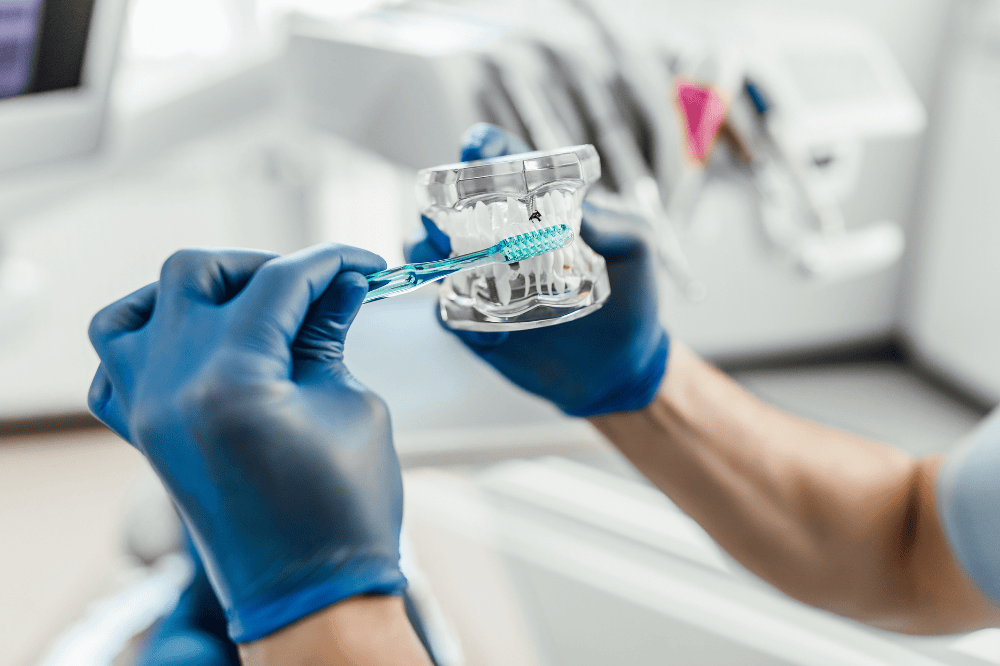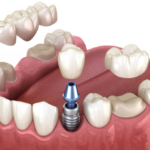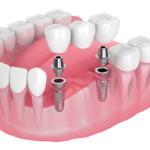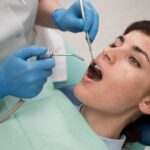Dental implants are one of the most common procedures used to replace lost teeth. They appear and, to the user, feel very natural, allowing the person to smile without fear. Nevertheless, many patients, including you, who get dental implants near you may experience pain after the procedure. Should this pain be a concern? Let’s find out.
What is a Dental Implant?
A dental implant is a tiny metal post that a dentist puts in your jawbone. It’s a substitute for the root of your tooth. Next, the dentist affixes a false tooth, a crown, to the implant. This new tooth securely remains in place and supports your natural tooth. The entire process is known as osseointegration.
Why Do People Get Dental Implants?
- They lost a tooth from an accident or injury.
- They lost a tooth because of decay or disease.
- They want to replace a tooth that has been missing for a long time.
Dental implants can be used to improve the way you eat, smile, and look. They are strong, long-lasting, and blend in with your natural teeth.
Is Pain Normal After Getting a Dental Implant?
Experiencing some pain after a dental implant is normal. The pain usually results from the healing process active inside your body. Below is a timeline of what you might feel:
First Few Days:
- Pain, swelling, and bruising around the implant site are common general body reactions.
- Your dentist is likely to offer you pain medicine to be used to ease the discomfort.
After the First Week:
- The discomfort will gradually lessen over time as your body heals.
- You remain sore and have a feeling of discomfort regarding touch or biting on that side.
Two Weeks Later:
- A significant part of the soreness and swelling will be reduced.
- If you continue to experience an excessive amount of discomfort, then it is good to schedule an appointment with your dentist.
When is Pain not Normal?
Severe Pain That Doesn’t Go Away:
If the pain gets worse (popularly known as hypersensitivity) or doesn’t go away after a few days, something might be wrong.
Signs of Infection:
Redness, swelling, and warmth around the implant site, along with fever, can be signs of infection. An infection needs immediate attention from your dentist.
Pain After Months:
If you suddenly start feeling pain months after the implant, it could mean there’s a problem with the implant or your jawbone.
What Causes Unusual Pain?
Unusual pain can be caused by several factors, including:
Infection:
An infection can occur if bacteria enter the site of the implant. This may lead to pain and inflammation, and, in some cases, it can compromise the bone.
Implant Failure:
It may sometimes not fuse with the bone at all. In such cases, pain may result, and the implant dislocates from its original position.
Nerve Damage:
Improper implant positioning may cause blood clotting, known as hematoma. As a result of it, you may experience severe pain and lingering discomfort.
Sinus Problems:
If the implant is in the upper jaw, it may protrude into one’s sinuses and cause pain.
Dental Implant Care
Dental implant problems can be avoided by taking good care of your implant. Here’s how to do it:
- Follow Your Dentist’s Words: Closely read and observe some directives given by your dentist about your implant and the care needed for it.
- Keep Your Mouth Clean: Brush and floss your teeth normally, and be sure to use an anti-bacterial mouthwash that your dentist approves of.
- Don’t Chew on Hard Foods: Avoid chewing on hard foods like ice or nuts that can crack or damage your implant.
- See Your Dentist Regularly: Regular check-ups help detect prospective problems in advance and ensure that your implant is in good condition.
Kings Pointe Dental Offers Dental Implants in Airdrie
You will experience some pain following the dental implant procedure—usually within the first few days. You should see your dentist if you notice unbearable pain over time, persistent pain, or pain associated with other symptoms such as oedema and fever.
Remember to talk to our dentist in Airdrie at Kings Pointe Dental if you ever have any concerns regarding your dental implant. They are here to assist you in keeping your smile full of health and vitality.






